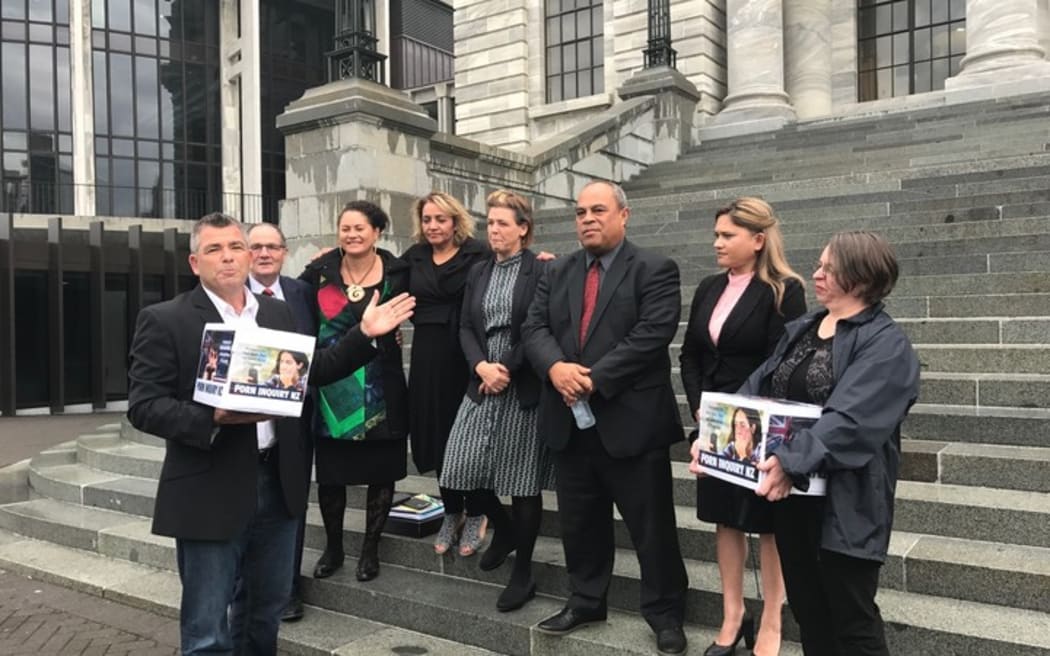Researcher Kris Taylor on the problem with Family First’s porn petition

A porn petition was presented on the steps of Parliament today Photo: RNZ / Mei Heron
On the morning of the 9th of February this year I was greeted with news that put me in a situation I never thought I would be in: agreeing with the staunchly anti-politically correct, registered charity, Family First.
I awoke to find that Family First had launched a petition calling on the government to appoint a panel of “experts” to investigate the role of pornography in New Zealand. Today, over two months later, this petition was submitted to parliament having garnered 22,334 signatures.
Now, as a pornography researcher and a SJW lib-cuck, my agreement with Family First on the need for an expert panel on pornography initially provoked an uncomfortable level of cognitive dissonance in me. Like a moth to the screen of a laptop I was drawn to the petition with a genuine interest in what Family First was proposing (not to mention a good splash of self-serving fantasy about being appointed to an expert panel on pornography use). With a sense of trepidation I read the first line of the petition’s press release which stated that the petition was “calling on politicians to investigate the public health effects and societal harms of pornography”. Wait, harms? Why include ‘harms’ as part of a mission statement of setting up an “expert panel” on the impact of pornography? Doesn’t that somewhat presuppose the outcomes of what this panel is expected to find?
Here is a bit of important porn history. In 1970, President Lyndon B. Johnson established the US President’s Commission on Obscenity and Pornography. This commission was appointed to ascertain what effects pornography might have on the general public. The commission represented the first major review of pornography’s effects by a governing body, with its central evidence drawn from as much of the empirical scientific research on pornography as was possible. However, much to the horror of the Nixon administration who had taken office prior to the publishing of the commission’s report, the results suggested that there was no conclusive evidence of a causative relationship between pornographic exposure and deviant behaviours, be they sexual or otherwise. As such, the findings of the report caused massive controversy and were roundly rejected by both the US Senate and Nixon as being morally bankrupt.
Sixteen years later, by the appointment of President Ronald Reagan, another attempt was made to get the correct answer to what pornography’s impacts were. In 1986 the Meese Commission, this time not stacked with ‘experts’ but religious fundamentalists and moral zealots - including avid anti-pornography campaigner Henry Hudson who acted as chairman - published the Meese report. This report held within it the results that the Commission on Obscenity and Pornography had ostensibly failed to find. The widely discredited 35 chapter report suggested that pornography was conclusively responsible for causing sexual violence and only just stopped short of suggesting that pornography was responsible for the erection of the great Satan himself if not banned forthwith. In hindsight, it looks like nobody has really taken it seriously.
Now, I know what you are probably thinking, “but Kris, you bloody pornography apologist you, there was no internet pornography back then! People didn’t have smart phones or laptops or Wi-Fi!” And I don’t disagree! The internet certainly has changed the way that pornography is delivered and the content that can be accessed. But that is not my point here. My point is that when you set up a panel of ‘experts’, and you pick them with a specific outcome in mind, you can have a panel of ‘experts’ deliver whatever result you want. In the case of the Family First petition their positions are fairly clear on what pornography causes: harm.
As someone who studies, and is currently conducting research on pornography use, I would like to pick one big bone that I have with an assertion made by Family First. They suggest in their petition and in subsequent press releases that the research on pornography is conclusive, when it simply is not. However, this is not only a Family First problem, but one I see frequently in articles on the perils of pornography. As such, I have noticed a wilful (or perhaps not so wilful) ignorance of any research that contradicts an author’s personally held assumptions about the role of pornography in society. For example, if I want to prove to myself (or anybody else) that pornography is a liberating, fulfilling, and ethically uncomplicated source of pleasure, I can look around and cherry-pick research that supports my preferred position. And if I want to find the opposite, that is easy to do too. And neither of these positions help anyone in understanding any of the important questions about pornography that we are trying to answer.
So where does this leave me and Family First? Well, I am still cognitively dissonant. I really genuinely do agree with Family First on some fronts; I too am concerned with some of the possible issues arising for some individuals using pornography, and I too would like to see a panel of experts take an earnest, reasoned look at the research and see what we can do for those affected by pornography consumption. However, what I don’t think will be much use is going into researching a moral question, with a fervently held moral position, expecting that we already have the answer.

